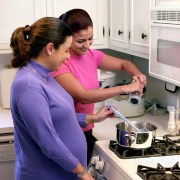 Photo: Getty Images
Photo: Getty Images
In the previous article, I discussed mercury amalgam fillings and anti-D injections as possible causes of autism. Now I will discuss the pregnant mother’s diet and the diet of her child.
Fish Consumption
Some research, from 1997 has suggested that if a mother-to-be eats fish during her pregnancy, it may cause developmental disabilities in her child. (2)
In the Faroe Islands, the main part of people’s diet is fish, so researchers looked at more than one thousand children born there between 1987-1988. In a study published in 2006, researchers examined cord blood, tissue and samples of the mother’s hair to determine how much mercury infants were exposed to in the womb.
Neuro-behaviorial tests were performed when the child reached seven years of age and again at 14 years of age. They determined that although the cognitive function of the children had not worsened between seven and 14 years (indicating their own fish consumption hadn’t harmed them), there were deficits noticed in infancy, meaning that the risk of neurodevelopmental disorders resulted from pre-natal exposure to mercury in fish.
“Indicators of prenatal methylmercury exposure were significantly associated with deficits in finger tapping speed, reaction time on a continued performance task, and cued naming ... The effects on brain function associated with prenatal methylmercury exposure therefore appear to be multi-focal and permanent.” (1)
In 2005, Environmental Health Perspectives found in their analysis of various studies into mercury and fish consumption, that "These results support findings from some studies that higher mercury exposure in pregnancy is associated with lower offspring cognitive scores, even at these relatively low levels of exposure.” (3)
The risk increases with the amount of mercury in the fish. Because of this, women have been advised to continue eating fish during pregnancy, but to choose varieties that are lower in mercury.
Vitamin Deficiency
Some medical professionals contend that malnutrition is an underlying cause of autism. Dr. Natasha Campbell-McBride, a neurologist and neurosurgeon, developed theories on the relationship between neurological disorders and nutrition and authored a book called "Gut And Psychology Syndrome. Natural Treatment Of Autism, ADHD, Dyslexia, Dyspraxia, Depression And Schizophrenia," after she successfully recovered her son from autism using nutrition.
This may sound incredible in an industrial society, but many families eat ready-made, processed foods and don’t get enough sunshine.
Lack of Vitamin D
One suggestion is that the rise in autism has coincided with increasing medical advice to avoid the sun. Although too much sun exposure can cause skin cancer, there are beneficial effects of the sun too such as the absorption of vitamin D and prevention of rickets.
Vitamin D is scarce in foods and is mainly available through the sun, yet the use of sunscreen blocks out vitamin D.
The United Kingdom is experiencing a resurgence of rickets and has several hundred cases of childhood rickets every year. Experts are blaming sunscreen and sitting in front of a computer for hours.
More than 50 percent of the U.K. adult population is also deficient in vitamin D and 16 percent of them severely in the colder months. (4)
In Cannell's study of Autism and Vitamin D, he observed when pregnant animals are deficient in vitamin D, they give birth to babies with enlarged brains and enlarged ventricles, something that is seen in autistic children.
Medical Hypotheses wrote:
“The apparent increase in the prevalence of autism over the last 20 years corresponds with increasing medical advice to avoid the sun, advice that has probably lowered vitamin D levels and would theoretically greatly lower activated vitamin D (calcitriol) levels in developing brains. Children with vitamin D deficient rickets have several autistic markers that apparently disappear with high-dose vitamin D treatment. Early childhood vitamin D deficiency may explain both the genetics and epidemiology of autism. If so, much of the disease is iatrogenic, brought on by medical advice to avoid the sun.” (5)
Vitamin D is also available from eggs and has been added to some breakfast cereals and if you don’t get much sunshine it’s important to eat these.
Folic Acid Supplementation
Like malnutrition, over-nutrition can also cause problems. The nutrition of the mother during pregnancy can influence her baby genetically without actually altering the genes.
Mice who were pre-disposed to becoming obese gave birth to healthy mice pups when they were given vitamin supplements, however, there can be too much of a good thing.
Dr. Rob Waterland, an expert on nutrition at Duke University, said in a New York Times article, he thinks routine folic acid supplementation of pregnant women may be contributing to autism.
Folic acid is taken to prevent neural tube defects in the baby, like spina bifida, and there isn’t much evidence that it’s harmful, but then there isn’t evidence that it’s harmless, either.
“The worry is that excess folic acid may play a role in disorders like obesity or autism, which are on the rise,” said Dr. Waterland. (6)
Medical hypotheses wrote:
“If it is true that too little folic acid results in nervous tissue damage, as is accepted by the scientific community in regard to neural tube defects (NTDs), then it seems plausible that too much folic acid may result in nervous tissue damage associated with autism. Children who develop autism may be receiving massive doses of folic acid in the uterus, as well as after birth. It would be of interest to carry out a case-control study.”(5)
Sources:
1.Debes F et al. Impact of prenatal methylmercury exposure on neurobehavioral function at age 14 years. Neurotoxicol Teratol. 2006 Sep-Oct;28(5):536-47. Epub 2006 Sep 1. Abstract:
http://www.ncbi.nlm.nih.gov/pubmed/17067778
2. Grandjean P et al. Cognitive deficit in 7-year-old children with prenatal exposure to methylmercury. Neurotoxicol Teratol. 1997 Nov-Dec;19(6):417-28. Abstract:
http://www.ncbi.nlm.nih.gov/pubmed/9392777
3.Oken E et. al. Maternal fish consumption, hair mercury, and infant cognition in a U.S. Cohort, Environ Health Perspect. 2005 Oct;113(10):1376-80. Abtract: http://www.ncbi.nlm.nih.gov/pubmed/16203250
4. Rickets warning from doctors as vitamin D deficiency widens, The Guardian. Web. 11 September 2011.
http://www.guardian.co.uk/society/2010/jan/22/sharp-rise-vitamin-a-defic...
5.Cannell JJ. Autism and vitamin D. Med Hypotheses. 2008;70(4):750-9. Epub 2007 Oct 24
Abstact:
http://www.ncbi.nlm.nih.gov/pubmed/17920208
6. A Pregnant Mother's Diet May Turn the Genes Around, New York Times. Web. 11 September 2011.
http://people.ccmr.cornell.edu/~ginsparg/Phys446-546/fa03/nyt07oct03epi....
7.Beard CM. et al. Is excess folic acid supplementation a risk factor for autism?Med Hypotheses. 2011 Jul;77(1):15-7. Epub 2011 Mar 31.2011.Abtract: http://www.ncbi.nlm.nih.gov/pubmed/21454018
8.Gut and Psychology Syndrome, Natasha Campbell-McBride MD. 13th September 2011.
http://gaps.me/preview/?page_id=35
Joanna is a freelance health writer for The Mother magazine and Suite 101 with a column on infertility, http://infertility.suite101.com/. She is author of the book, Breast Milk: A Natural Immunization, and co-author of an educational resource on disabled parenting.
She is a mother of five who practiced drug-free home birth, delayed cord clamping, full term breast feeding, co-sleeping, home schooling and flexi schooling and is an advocate of raising children on organic food.
Reviewed September 14, 2011
by Michele Blacksberg R.N.
Edited by Malu Banuelos






Add a CommentComments
There are no comments yet. Be the first one and get the conversation started!